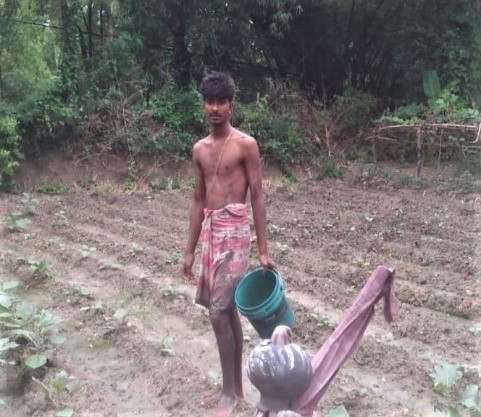India
- History
- Our Work
- Transforming Development Through Innovation & Partnership
- U.S.-India Triangular Cooperation
- Partnership for Energy Access and Security
- Partnership for Sustainable Forests in India
- Partnerships for Health
- Partnership for Education
- Partnership for Water Sanitation and Hygiene (WASH)
- Partnership for Food Security
- Partnership for Gender Equality
- Investing in Afghanistan
- Foreign Assistance Data
- Newsroom
- Newsletters and Fact Sheets
- Speeches
- Resources For Implementing Partners (RFIP)
- Careers
- Partnership Opportunities
- Success Stories
Speeches Shim

In mid-May 2020, while people in India were grappling with the lockdown in response to the COVID-19, farmers in the states on the east coast braced for a second threat – the cyclone Amphan.
Pabitra Kumar Sahoo grows paddy and vegetables on his family’s one-acre land in a village in Odisha, which supports the family of six – his grandmother, parents, two sisters, and him. Farming the land is Pabitra’s only livelihood, as he could not find any work after he graduated from high school.
On May 17, Pabitra received a text message from the Skymet Weather Services Private Limited (Skymet), USAID’s implementing partner in the Partnership in Climate Services for Resilient Agriculture in India. The text said that the “Extremely Severe Cyclonic Storm (Amphan)” was hitting West Bengal, another coastal state next to Odisha, and “parts of Odisha will experience very strong winds” between May 18-20. Another text message informed him that heavy rain and thunderstorms “with isolated extremely heavy and strong winds with speed 120 to 130 kmph are expected over Bhadrak,” the district where Pabitra’s village is located, from May 20-21. A few minutes later, Pabitra received an automated voice call from the USAID-Skymet project team which relayed the same message.
Pabitra realized he needed to make a quick decision in order to protect his crops – his paddy crop was in the harvesting stage. Weighing the benefit of hiring extra labor to help with the harvest against the risk of his crop being damaged, Pabitra decided to spend the money on hiring the help.
Pabitra trusts the information from the USAID-Skymet partnership project and relies on them daily, since he met the field workers and enrolled in the partnership program in 2018. Twice a week, he has been receiving free location-based weather forecasts and agricultural advisories via text messages and voice calls. He has seen the project’s Automatic Weather Stations installed in the fields of his village and the Skymet field workers observing the crops and recording the data from the weather stations. He has also been attending the farmers meetings organized by the project team, in which the farmers share information and experiences; listen to experts and learn best farming practices; and obtain information about agriculture insurance. Through these meetings, he is able to better plan his farming activities and optimize the use of resources such as water and fertilizers.
Indeed, the cyclone “Amphan” made a raging landfall near Odisha on May 20. Pabitra’s village was impacted by gusty winds and torrential rains.
Pabitra felt happy with his decision, “Timely information helped me in saving my produce.” His fellow farmers in the village agreed, as Pabitra had shared Skymet messages with them so they saved their crops too.
Since 2015, USAID has partnered with Skymet in the Partnership in Climate Services for Resilient Agriculture in India, which enables farmers to make informed decisions to maximize their income. To achieve this goal, the USAID-Skymet team takes a community-based approach to provide the farmers with time-sensitive, location-specific weather and farming advisories through in-person meetings, and a variety of digital platforms, including the SkyMitra App and WhatsApp, SMS and voice calls in English and five local languages. To date, more than 85,000 farmers across nine Indian states have enrolled in the program and received the information for free. Among them, nearly 58 percent are small and marginalized farmers and approximately nine percent are women farmers, most of whom do not have smartphones or internet services at home.
Even during the nationwide lockdown in response to the COVID-19, these farmers continued to have access to crucial information digitally, as well as information related to COVID-19, such as social distancing and other protective measures and best practices, and government notices on movement restrictions and financial assistance. During the time when misinformation was rampant, the USAID-Skymet partnership helped equip the farmers to best safeguard their livelihoods.
Asked if Pabitra is concerned about the upcoming monsoon season this year, he said, “I am prepared.”

Comment
Make a general inquiry or suggest an improvement.